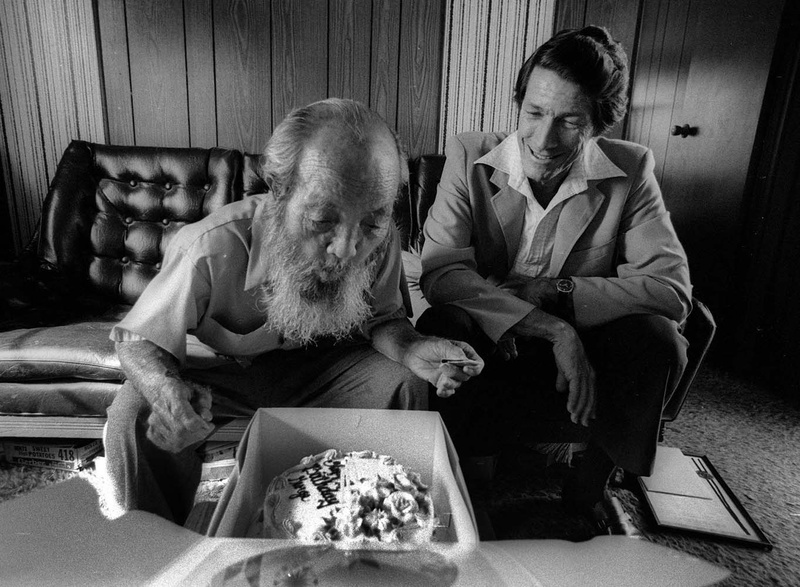Morikami Sukeji, who traveled to America as a member of the Yamato Colony in South Florida and remained there alone until the end of his life after the colony was disbanded, continues to write letters to his sister-in-law and her family, who lost her husband (Sukeji's younger brother) after the war. He is overcome with emotion as he marks 70 years since coming to America despite his various illnesses and poor health, and turns 90 by Japanese reckoning. He tearfully recalls his parents and siblings, who he has never seen since leaving his hometown and who have passed away before him. At the same time, he looks back on the years that have passed and laments, "I couldn't do anything," and "It was nothing more than a long dream."
* * * * *
New houses are being built one after another
July 26, 1975
Rei-san (niece), it's been a while since I last saw you. My mood hasn't changed. Sometimes it's good and sometimes it's bad. There's a lot of trouble and I get cranky. Prices are going down a little except for meat. Clothes and furniture are being sold at a discount, so it seems like they don't wear very much. I have money, but I don't spend it. First of all, I'm worried, so everyone is saving it in the bank.
Interest rates are falling, banks are booming, and new houses are being built one after another. Housing and land prices have fallen sharply. The current situation will likely continue for the next few years. The newspapers write about the good economy, but it's not something to be trusted. Bankruptcies are on the rise and everyone is worried.
Japanese TVs and cars have also dropped in price and can be bought much cheaper. It is the height of summer here now, and it is scorching hot on windless days. The beaches are packed with summer vacationers. Everyone in the area goes to the mountains. They go even if they have to make do with their travel plans. I haven't seen the mountains in a long time. I would like to go, but my legs are so weak that I can't do anything. All I can do is lie down in the shade of the trees and dream. It must be hot in Kyoto already, and it's probably the same in Miyazu.
It's fine to serve the world and people, but... the newspaper articles about me are almost all like novels, and are far from the truth, as they are written for the sake of the prize money.
I immediately gave the books to the sick person, but he didn't seem to be reading them, so I took them all back. On the 22nd, a German friend came over. It was the first anniversary of her late husband's death. He was a rare good person and one of my best friends. The Snyder family is all doing well. Her husband, Ross, is busy repairing the house, and Virginia is working hard on her book while working for the city. Her adopted son, Oe George, is now in Tokyo.
I've been exchanging letters with you guys for almost thirty years. I have several hundred letters, but I don't want to burn them, so I don't know what to do with them. If you don't mind, I'll send them all to you. They'll be useful for something someday, and they'll be a great way to reminisce about past events.
(The text attached to the postcard I sent)
Postcard 1: Sunset on the Florida coast - the same today as it was back then.
Postcard 2: This is a view of the coast here. In winter, it is crowded with tourists and there is no room to stand. Nearly 70 years ago, there was not a single person in sight and few ships passing by offshore.
Above all, learn a language
September 17 or 21, 1975
Reiko-san, I have read your letter over and over. I understand your feelings all too well. You are, so to speak, returning to your old home. It may be uncomfortable to live in an unsympathetic, old-fashioned house, but I can understand your mother's feelings. I think the truth is what people say in the moment, rather than worrying about the future. There are a lot of fools in the world. Don't worry about it, just leave it alone.
You say you love sewing more than anything. If you love something, you will be good at it, so it's best to do what you love most. But what are your plans? Maybe you'll run your own shop, or work and teach at a school. There are many ways to go about it.
At first, right after your divorce, your mother asked me to take you in. It was the same one-person thing. I had no choice but to refuse, explaining why it was impossible.
Today, I received a letter from a friend in Washington. His wife teaches sewing as a side job, and it was a big success, with 150 applicants during her two-month vacation last summer. Most of them were teenagers, and she was surprised.
You can't go to America as a laborer. But there are various ways. You can enter the country or be adopted. If you wait five years, you can become a naturalized citizen. Before you do anything, you need to learn the language. If you can speak simple English, it's easy to find a job, and you can improve quickly.
I think you've been worrying about a lot of things. The letter I received today reminded me of you, so I decided to write to you. Please think about it carefully and let me know in detail. Haste makes waste. I recently received a letter from Akiko (my niece). It's been a while since I last heard from her, so it was a surprise. At the end of last year, I notified her of my naturalization. She was more pleased than anyone else. She was sad, but she never said a word.
I also said some harsh things to him. Correspondence stopped. He didn't even send a New Year's card. From the letters, it seems he quit his job and is undergoing training. It's a mystery to me, considering he was using his salary to help support the family. I think he probably received a huge donation from a wealthy follower.
"There is someone nearby who is from Kyoto."
October 6, 1975
Thank you for your letter, Mi-san (sister-in-law). It's been so long, I'm sorry, but I don't have anything to write, so I left it as it is. I thought about it, but no matter how hard I try, nothing goes as I want it to. I end up feeling burned out and wanting to say, "Do as you please." Everyone is tired of other people's fates. I've been sick for a long time. My legs are weak, my stomach ulcer has recurred, I've been vomiting blood, and I was worried for a while. My kidneys are bad. My heart is weak. Even the smallest things tire me out easily.
I can't do anything. I can only lie down and reminisce and daydream. My neighbors are there, but they're always out, so unless they come, there are times when we don't say a word for two or three days. It's October again this year, and it's hot and humid. It's pretty hot on sunny, windless days, but it's cool tonight. There are almost no mosquitoes or flies left.
There is a woman from Fushimi (Kyoto) nearby. She is a war bride and her 20-year-old son is studying at a nearby university. She is around 40 years old, but is so pretty that she looks about 10 years younger. She is cheerful and has a good reputation. She is a kind person who always gives us rare Japanese items. Fushimi is famous for Japanese persimmons, including handmade Mino persimmons. She will be returning to Japan next summer, so I've decided to have you meet her.
After a long battle with illness, doctors, medicine and oral health regimen have all been ineffective. I am living my life according to my destiny, with nature as my friend.
"It's all thanks to this country."
November 1975
Thank you, Rei-san, for the nori (seaweed). It's been a while since I've eaten my favorite sushi rolls. I'm not good at cooking. It's already mid-November, and the New Year is just around the corner. It reminds me of my favorite ozōni. No matter how many years pass, I can't forget the taste of my home country. It's neither too hot nor too cold here. It's heaven on earth.
I decided to keep all the letters from the country. Mr. Snyder (a journalist and friend of mine) said they would be useful for my book. Shoji Oe (a native of Oita Prefecture), who was adopted by the Snyder family, is fluent in both Japanese and English and works as a translator. He is currently in Japan, but will be back by Christmas.
I was more surprised than ever when I read the old letters. About Masahira (younger brother), the hardships of my parents, and the heartache of Yoneji (younger brother). My eyelids burned. Yoneji wrote about you when you were about XX years old. Recently, my eyesight has suddenly deteriorated and I have become hard of hearing. Sometimes the phone is useless. I am half-paralyzed and cannot stand. I am burned and beaten.
I'm 90 years old (by traditional Japanese age). It's been 70 years since I came to America. I tried my best, but I couldn't accomplish anything. It was just a long-held dream.
I am old and alone in the world. I am sick in a foreign land, but fortunately I have no worries about food. I owe it all to this country. I want to somehow give back while I am still alive. It has been said that human life is like morning dew. I don't know what tomorrow will bring. I have assets. I have real estate and bank deposits, and I am in the process of rewriting my will.
(Titles omitted)
*Approximately four months after writing this letter to his niece, on February 29, 1976, Morikami Sukeji (George Morikami) passed away at the age of 89 years and three months.
© 2020 Ryusuke Kawai







